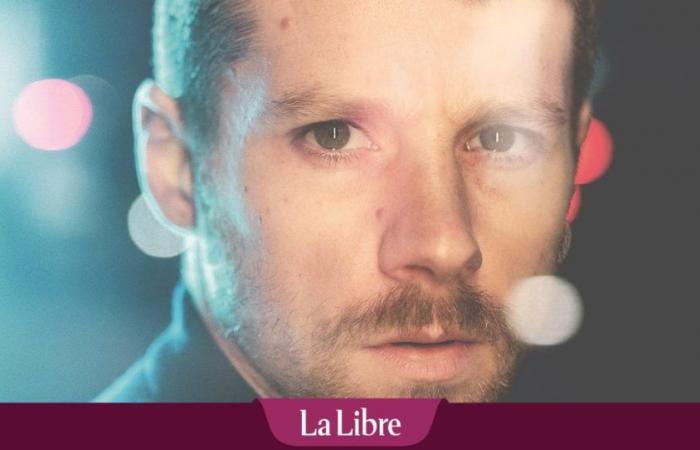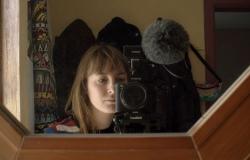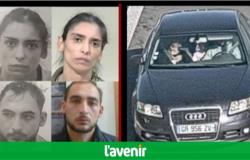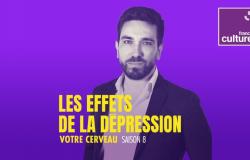Salt Gosse on child protection, a world in which his educator father was immersed. Don’t stop runninga story about Toumany Coulibaly, French 400 meter champion by day and thief by night. This portrait, which we can only recommend, earned him the Interallié prize. Our fathers, our brothers, our friends (Les Arènes), an investigation written in the extension of its podcast on domestic violence. Today, the native of Rys-Orangis signs Men lack courage**a novel inspired by true events about the secrets and traumas we pass on to our children. Particularly through the dialogue between a woman who was once raped, and her son who has just abused his girlfriend.
Feelings with Florence Aubenas: “I had planned to last five years…”
The writing of this book began with a message you received on Facebook. Jessie (not her real name), maths teacher, in her 40s, had listened to your podcast. She writes to you to tell you that she has not necessarily experienced this violence, but that she feels concerned. “That she had buried all that.” You decide to meet her without knowing if you were going to write about her?
I met her and listening to the tape again, I said to myself: she really is someone extraordinary. In the sense that I had never met anyone like her. We saw each other regularly, but I didn’t think about writing his story. Until the day she called me to tell me: this weekend, my son raped his girlfriend. That interested me because I wanted to write about family secrets. On the impression we have that a curse is passed down from generation to generation. As if we transmit our traumas to our own children at the time of birth. I had often witnessed this in this investigation into violent men. Men who had grown up in violence, had sworn not to be like their fathers, found themselves in the same situation as them. We had already seen each other for over a year. There, I told him: listen, this story is interesting and I think I want to write about it.
“Don’t Stop Running” was a story. Here, you are writing a novel inspired by real events. For what ?
She is a math teacher and I couldn’t see myself exposing her life like that under her real name. It wasn’t necessarily doing her a favor to offer her students the opportunity to spread rumors about her, about prostitution, domination, the rape she suffered… I wanted her to protect and his son who is a minor too. We quickly agreed to anonymize. And then, I felt the desire to write to “I” while being in his place. It was a leap into fiction. It wasn’t a foregone conclusion, but I wanted to try.
Did you have difficulty writing a woman’s point of view “in her place”, as a man?
It would have been a lot more complicated if I hadn’t spent so much time listening to it. I allowed myself to do it, because I had stored 30 hours of interviews with her. I had seen, heard, listened to her so much. I had so much in mind the musicality of his sentences, his voice, his laughter, his way of getting angry, that I said to myself: it’s possible. Without that, I never would have done it. That would have been the best way for me to screw up. A reader had to be able to go into it and say to herself: I spent more than 300 pages with this Jessie.
Would you have been able to imagine this story?
No. I can invent things, but not lives that are too far from mine. I am not a woman, I do not have a 15 year old child, I was not raped, I did not grow up with parents who neither looked at me nor loved me. Without all this prior work, writing saying “I” while being “she”, for me it would have been as much science fiction as writing the Lord of the Rings…I don’t feel capable of it. I need material, flesh, something solid on which to plant my feet. If I don’t have that, it floats, I don’t know where it goes…
“At the time, a guy who offered me McDonald’s, I thought I should have sex with.” Is that a sentence she said to you?
Yes… This is one of the sentences she said which are very telling because it clearly shows her emotional distress and her trauma. Because it happens after the rape she suffered at 18. She then lived four years of wandering and felt like she almost had to sleep out of politeness. This is the gray area question. Women who didn’t say “no”, but who didn’t want to and who, for fear of being seen as “assholes”, preferred to sleep with guys they didn’t like, but who had invited them to a restaurant .
“These fierce soldiers” by Joël Egloff
In the novel, we see that men, especially the most toxic ones, sense Jessie’s fragility. Some women keep telling toxic stories. How can we explain it?
I had met several psychologists who said: violence is the trauma of one person encountering the trauma of another. A violent man is not a bloodthirsty guy who is absolutely looking for prey, he is two people who have the impression that chance brings them together, when it is their traumas that bring them together. Obviously, it’s bad. A girl who doesn’t have all these traumas will leave at the first insult. Jessie stays because she is damaged, weakened, by all the guys from before.
Jessie confides in her son during a car ride after his rape. Does it have to be an emergency or be stuck in a passenger compartment on a highway for parents to be able to talk about such tough subjects?
In the real story, not the novel, she had wanted to talk about her rape and her life for several weeks before the incident happened. She told me: I think he’s too young for me to be able to tell him something like that. He couldn’t stand it. And then, he admits to her that he raped his girlfriend, she tells him, but without having planned it. For me, the moments when I learned about the life my mother had had before having me, they were not moments of emergency at all. It was when she was in her room, during a nap or when I came home from a party and went to see her lying down. From 15-16 years old. And we could have a discussion like in a car without having to look each other in the eye. In the dark. It was very beneficial for me to learn about her life, including discovering that she had suffered from depression. This allowed me to better understand who she was, how she was constructed. It helped me feel good in my sneakers. It’s important to know where we come from. My father never knew his biological father, for example. I know the trauma it was for him.
In 2013, I met violent men in Belgium. At the time, I was surprised by the diversity of profiles, with a man who worked, in particular, at the European Commission. These men could be super nice during the interview and still hit their partner. Far from the image of the stupid brute that I might have had. Did you also have clichés about violent men before your podcast on France Culture?
It’s funny, because I knew that, because I had already worked a lot in prison. And, for all that, the image of the violent man was still completely cliché for me. A man necessarily less intelligent, less educated than me, lower in ceilings, more of an alcoholic. When I entered this room, I met some guys with whom I enjoyed laughing and drinking a beer. “Normal” guys, like 350,000 of whom I meet every day. This was the starting point for introspection and reflection. To say: wait, if these guys look like you, you feel close to them, so ask yourself questions.
Yasmina Khadra: “In France, I am always excluded, boycotted, you will never see me on the list of an award”
In all your books, you talk about people who have made mistakes and sometimes serious ones. We don’t sense any judgment on your part, rather empathy.
I never tell myself that I couldn’t be in their place. Or rather, the opposite, I always tell myself that I could be in their place. I realize that I could have ended up in prison. I already had my license revoked for driving drunk. I was lucky that I was stopped before I had an accident. I would have been in prison at 26. I would not be presented as an author, but as a delinquent. The line between good society and “rejects” is super thin. We have an easy time putting labels on people’s faces and judging their actions. I consider that I am not a judge, my job is rather to understand, beyond what they have done, who they are. Their trajectory interests me a lot. It’s a story, encounters, deaths, traumas, mistakes, sometimes bad luck too.
You go to colleges to talk to teenagers. Is it important?
At that time, I would have liked to have met a living author, a journalist who would have spoken to me about this profession. So, I do it a lot, especially in places that need it. I don’t think it’s very useful to go to the 6th arrondissement of Paris. I often go to the suburbs, to the countryside, particularly near Mulhouse, a very, very poor region. With them, I also talk about boy-girl relationships. On issues of consent, MeToo, girls are made aware of this at a very young age. I see a gap between boys who are still a bit childish and girls, who are mature, and who often already have more mature thoughts on the issue.






